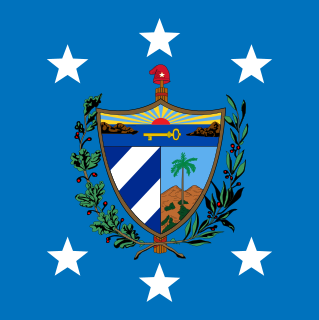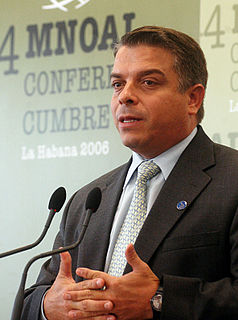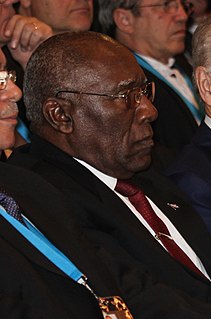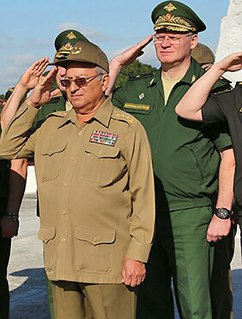 |
|---|
| This article is part of a series on the politics and government of Cuba |
|
Executive |
Judiciary
|
|
An indirect presidential election was held in Cuba on 24 February 2008, in which the National Assembly of People's Power elected a new President of Cuba and the members of the Council of State. The election followed the January 2008 parliamentary election. In the election, Raúl Castro, who had been Acting President since July 2006, was elected as President, succeeding his brother, Fidel Castro.

Cuba, officially the Republic of Cuba, is a country comprising the island of Cuba as well as Isla de la Juventud and several minor archipelagos. Cuba is located in the northern Caribbean where the Caribbean Sea, Gulf of Mexico and Atlantic Ocean meet. It is east of the Yucatán Peninsula (Mexico), south of both the U.S. state of Florida and the Bahamas, west of Haiti and north of both Jamaica and the Cayman Islands. Havana is the largest city and capital; other major cities include Santiago de Cuba and Camagüey. The area of the Republic of Cuba is 110,860 square kilometres (42,800 sq mi). The island of Cuba is the largest island in Cuba and in the Caribbean, with an area of 105,006 square kilometres (40,543 sq mi), and the second-most populous after Hispaniola, with over 11 million inhabitants.

The National Assembly of People's Power is the legislative parliament of the Republic of Cuba and the supreme body of State power. Its members are elected from multi-member electoral districts for a term of five years. The Assembly's current President is Esteban Lazo Hernández. The assembly meets twice a year. Between sessions it is represented by the 31 members Council of State. The most recent elections were held on 11 March 2018.

The President of the Republic of Cuba, officially called President of the Council of State between 1976 and 2019, is the head of the Council of State of Cuba. The office in its current form was established under the Constitution of 2019. The president is the second most powerful position, after the First Secretary of the Communist Party of Cuba.
It was initially considered uncertain whether the ailing 81-year-old Fidel Castro would be elected for another term as President of the Council of State or acting president Raúl Castro would formally assume the presidency, [1] but on 19 February Fidel Castro said that he would not seek another term because his physical condition would not allow him to properly carry out the duties of the office. [2]
Raúl Castro, aged 76, was elected as President of the Council of State and the Council of Ministers by a unanimous vote of the National Assembly [3] (on a ballot with only his name for the position [4] ) on 24 February 2008. [5] José Ramón Machado Ventura, at age 77, was elected as First Vice-President of the Council of State and the Council of Ministers, [3] [6] contrary to speculation that someone younger would be chosen for the post. [5] Raúl emphasized that his brother remained "Commander in Chief of the Cuban Revolution", [5] [6] and the National Assembly voted to permit Raúl to consult with Fidel on important issues. [6]
José Ramón Machado Ventura, M.D. is a Cuban revolutionary and politician who was the First Vice President of the Council of State of Cuba from 2008 to 2013. With the election of Raúl Castro as President of Cuba on 24 February 2008, Machado was elected to succeed him as First Vice President. He has been Second Secretary of the Communist Party of Cuba since 2011.
600 deputiess chose to cast united votes for all Council of State candidates, while nine deputies cast selective votes. Castro was elected with a unanimous vote of 609 deputies, while Machado received 601 votes. Juan Almeida Bosque, Abelardo Colomé Ibarra, Carlos Lage Dávila, Esteban Lazo Hernández, and Julio Casas Regueiro were elected as Vice-Presidents of the Council of State, all receiving 608 votes except for Lage, who received 609. José Miyar Barruecos was elected as Secretary of the Council of State with 608 votes. 23 other members of the Council of State were elected: [3]

Juan Almeida Bosque was a Cuban politician and one of the original commanders of the insurgent forces in the Cuban Revolution. After the rebels took power in 1959, he was a prominent figure in the Communist Party of Cuba. At the time of his death, he was a Vice-President of the Cuban Council of State and was its third ranking member. He received several decorations, and national and international awards, including the title of "Hero of the Republic of Cuba" and the Order of Máximo Gómez.
Corps General Abelardo Colomé Ibarra was a Vice President of the Council of State of Cuba and the Cuban Minister of the Interior, serving in the latter position from 1989, until his retirement in October, 2015. Known as Furry he first laid the foundations of State Security in 1959.
Carlos Lage Dávila is a Cuban politician. Until 2009, he was a Vice President of the Council of State of Cuba, a member of the Politburo of the Communist Party of Cuba, and Executive Secretary of the Council of Ministers of Cuba. Lage was described as Cuba's de facto prime minister.
- José Ramón Balaguer Cabrera (608 votes)
- Iris Betancourt Téllez (609 votes)
- Roberto Fernández Retamar (609 votes)
- Luis Herrera Martínez (608 votes)
- Orlando Lugo Fonte (608 votes)
- Felipe Pérez Roque (609 votes)
- Pedro Sáez Montejo (609 votes)
- Ramiro Valdés Menéndez (608 votes)
- Francisco Soberón Valdés (608 votes)
- Carlos Valenciaga Díaz (609 votes)
- Surina Acosta Brook (609 votes)
- Regla Dayamí Armenteros Mesa (609 votes)
- Leopoldo Cintra Frías (609 votes)
- Inés María Chapman Waugh (609 votes)
- María del Carmen Concepción González (608 votes)
- María Yolanda Ferrer Gómez (609 votes)
- Guillermo García Frías (608 votes)
- Tania León Silveira (609 votes)
- Álvaro López Miera (608 votes)
- Julio Martínez Ramírez (609 votes)
- Dignora Montano Perdomo (609 votes)
- Juan José Rabilero Fonseca (606 votes)
- Salvador Valdés Mesa (609 votes) [3]
José Ramón Balaguer Cabrera was the Minister for Health in Cuba until July 2010.. He is also a member of the Political Bureau of the Communist Party of Cuba and a member of the Council of State of Cuba. Balaguer was one of the six members of the Cuban Government designated by Fidel Castro in his transfer of duties on July 31, 2006.
Roberto Fernández Retamar is a Cuban poet, essayist, literary critic and President of the Casa de las Américas. In his role as President of the organization, Fernández also serves on the Council of State of Cuba. An early close confidant of Che Guevara and Fidel Castro, he has remained a central figure in Cuba since the 1959 Revolution. Fernández has also written over a dozen major collections of verse and founded the Casa de las Americas cultural magazine.

Felipe Ramón Pérez Roque was the Minister of Foreign Affairs of Cuba from 1999 to 2009. At his appointment, he was not only the youngest member of the Cuban cabinet but also the only one to be born after the Cuban Revolution in 1959.





